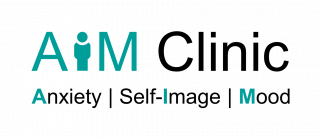The Anxiety self-Image and Mood (AIM) Clinic is a specialist NHS clinic offering assessment and treatment for young people and young adults with body dysmorphic disorder (BDD).
- About the clinic
- Who we can support
- What we can provide
- How to make a referral
- How to contact the clinic
- Clinic Team
- Useful Resources
About the clinic
Most people worry about their appearance from time-to-time, but for some people appearance concerns dominate their life. Body dysmorphic disorder, abbreviated as BDD, involves preoccupying appearance-concerns that cause a lot of distress and/or get in the way of day-to-day activities. BDD usually also involves time-consuming repetitive behaviours, such as checking, concealing or trying to change aspects of appearance. People who have BDD very often also experience anxiety and/or mood problems, such as depression. Research shows that BDD usually develops in during adolescence and is a relatively common problem, affecting about 2% of young people and young adults, but it often goes undetected and undiagnosed. Importantly, there are effective treatments for BDD, namely BDD-specific cognitive behaviour therapy (CBT) and a group of medications called selective serotonin reuptake inhibitors (SSRIs).
The Anxiety self-Image and Mood (AIM) Clinic is a specialist NHS mental health service offering assessment and treatment for young people and young adults with body dysmorphic disorder (BDD), and related anxiety and mood difficulties. The clinic is based within the UCL University Clinic and is part of Camden and Islington NHS Foundation Trust. The team consists of a Consultant Clinical Psychologist (Dr Georgina Krebs), a Consultant Psychiatrist (Professor Argyris Stringaris), a Clinical Psychologist (Dr Elizabeth Hogg), and a Trainee Clinical Psychologist (Ashley Scott).
The AIM Clinic is a clinical academic centre, which means that we provide a clinical service and may also offer the opportunity to be involved in research. This helps us to work towards our goal to help improve understanding of the development and maintenance of BDD and related disorders, and to improve treatments.
Who we can support
The AIM clinic is a free and confidential service. We support UCL students aged up to 24 years who are experiencing anxiety about their appearance, and meet diagnostic criteria for BDD. Some people may also be experiencing additional related mental health problems, such as social anxiety or low mood. It is not necessary for a diagnosis of BDD to have been made prior to referral to our service. We currently accept referrals from iCope (primary care psychological services in Camden and Islington). We anticipate expanding our referral pathways in the future.
What we can provide
We offer diagnostic assessments and evidence-based treatment for BDD. Treatment can involve up to 20 sessions of specialist cognitive behaviour therapy (CBT) for BDD and/or medication (primarily selective serotonin reuptake inhibitors, known as SSRIs). We can also provide treatment for some co-occuring problems that are closely related to BDD, such as obsessive-compulsive disorder, social anxiety disorder and depression.
Sessions are primarily face-to-face at the UCL University Clinic, Torrington Place.
How to make a referral
We currently accept referrals from iCope (primary care psychological services in Camden and Islington). Clinicians within iCope can get in touch to make a referral, or discuss a potential referral, using the contact details below. We currently accept UCL students age up to 24 years.
We are aiming to expand our referral pathways in the coming year.
How to contact the clinic
Email: AIMclinic@candi.nhs.uk
Address: The University Clinic | 6th Floor 1-19 Torrington Place | London | WC1E 7HB
If you are in need of urgent help in relation to your mental and emotional wellbeing, please contact your GP, attend your nearest A&E department, or call the Samaritans (116 123).
Clinic Team
Professor Argyris Stringaris, Honorary Consultant Psychiatrist
Dr Georgina Krebs, Honorary Clinical Psychologist
Ashley Scott, Trainee Clinical Psychologist
Dr Elizabeth Hogg, Honorary Clinical Psychologist
Lucy Blacker, Marjan Biria, Isobel Ridler, Honorary Assistant Psychologists
Useful Resources
The BDD Foundation is a UK charity which aims to increase awareness and understanding of dysmorphic disorder (BDD).
Appearance Anxiety: A Guide to Understanding Body Dysmorphic Disorder for Young People, Families and Professionals by Maudsley Hospital National and Specialist OCD, BDD and Related Disorders Service for Young People
Overcoming Body Image Problems including Body Dysmorphic Disorder: a Self-help Guide Using Cognitive Behavioural Techniques by Rob Wilson.
Feeling Good about the Way You Look: A Program for Overcoming Body Image Problems by Sabine Wilhelm.
Useful Resources for Clinicians
There are a number of resources that clinicians can use to support the treatment of BDD here are two examples:
Body Dysmorphic Disorder: A Treatment Manual by David Veale and Fugen Neziroglu
Cognitive-Behavioral Therapy for Body Dysmorphic Disorder: A Treatment Manual by Sabine Wilhelm
 Close
Close


